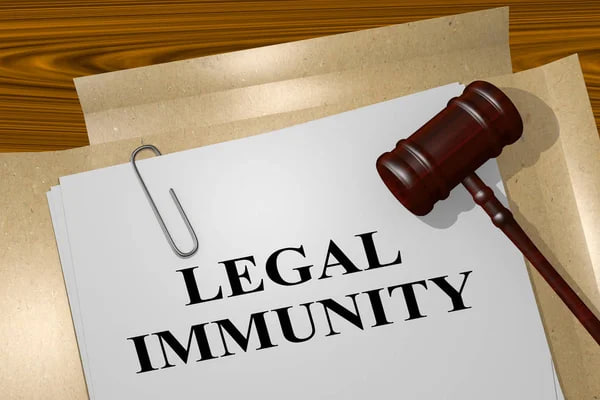Legal immunity might sound like a complex term, but it’s something that plays a vital role in the justice system. Whether it’s protecting government officials, medical professionals, or witnesses, this concept ensures certain individuals or entities are shielded from legal responsibilities under specific conditions. Understanding the different types of legal immunity and how it impacts various sectors can provide valuable insight, especially if you’re dealing with legal matters that could involve this principle.
What Is Legal Immunity?
Legal immunity refers to the exemption of an individual or entity from being held liable under the law, even when they would typically face consequences for their actions. Essentially, it shields certain people or organizations from prosecution or lawsuits under certain conditions. The rationale behind legal immunity varies, but it often aims to encourage cooperation, protect public officials in their duties, or ensure the efficient functioning of government and societal systems.
Different Types of Legal Immunity
There isn’t just one type of legal immunity. Depending on the context and legal jurisdiction, various forms of immunity may apply. Below are the most common types:
1. Sovereign Immunity
Sovereign immunity applies to governments and their officials, protecting them from lawsuits or prosecution. It is based on the principle that the state cannot commit a legal wrong and is therefore immune from civil suits or criminal prosecution unless it consents to be sued. This type of immunity ensures that governments can function without the constant threat of litigation.
2. Diplomatic Immunity
Diplomatic immunity is granted to foreign diplomats to ensure they can perform their duties without fear of legal interference from the host country. It allows diplomats to operate independently of the local legal system, but it’s important to note that diplomatic immunity does not mean they are free to commit crimes. Diplomats can still be declared “persona non grata” and sent back to their home country.
3. Witness Immunity
In legal cases, witnesses can sometimes receive immunity in exchange for their testimony. This is often used in criminal cases where a witness, who may have been involved in the crime, agrees to provide crucial information in return for protection from prosecution. The two main types of witness immunity are transactional immunity and use immunity. Transactional immunity offers complete protection from prosecution, while use immunity only prevents the testimony from being used against the witness.
4. Qualified Immunity
Qualified immunity protects government officials, particularly law enforcement officers, from civil lawsuits unless they violated a “clearly established” legal right. This type of immunity is often controversial, particularly in cases involving police misconduct. It’s meant to allow officials to perform their duties without fear of being sued for honest mistakes, but it has also been criticized for allowing abuses of power to go unpunished.
5. Judicial Immunity
Judicial immunity protects judges from being sued for their decisions made in the course of performing their judicial duties. This type of immunity is essential for maintaining the independence of the judiciary, ensuring that judges can make decisions without fear of personal liability.
Why Legal Immunity Exists
The purpose of legal immunity varies depending on the type, but it generally aims to serve the greater good. In cases of sovereign immunity, for example, the idea is to allow government functions to continue uninterrupted. Diplomatic immunity ensures that international relations run smoothly, while witness immunity encourages individuals to come forward with vital information that could be crucial in prosecuting crimes.
Legal immunity does not mean the law can be broken without consequence. It is a tool used to strike a balance between maintaining law and order and allowing certain systems or officials to function effectively.
Legal Immunity in Different Sectors
Legal immunity is not just reserved for government officials and diplomats. It plays a significant role in other areas such as healthcare, corporate governance, and law enforcement.
Healthcare Sector
Medical professionals can sometimes be granted immunity in specific situations, particularly during emergencies or when performing risky procedures that could save lives. For instance, doctors or medical staff may receive legal immunity when responding to public health crises, such as during the COVID-19 pandemic. This helps protect healthcare workers from lawsuits while they perform essential, and often dangerous, work under pressure.
Corporate World
Corporate immunity may apply to businesses or executives under specific circumstances, particularly when they are following regulatory guidelines. For example, if a company is compliant with environmental regulations, they may be immune from lawsuits related to certain environmental damages unless gross negligence is proven.
The Limits of Legal Immunity
While legal immunity offers protection from lawsuits or prosecution, it is not without limits. Immunity can be waived, or an individual can lose immunity if they step outside their official capacity or engage in illegal activities. For example, a government official may lose qualified immunity if they violate a well-established legal right or act outside the bounds of their duties.
Similarly, diplomats can lose their immunity if their home country agrees to waive it, allowing them to be prosecuted in the host country. Witnesses who have been granted immunity can also lose that protection if they commit perjury or fail to fulfill their obligations under the immunity agreement.
Criticism andcontroversies
Legal immunity has often been the subject of debate, particularly regarding law enforcement and qualified immunity. Critics argue that it provides too much protection and can lead to abuses of power. For instance, the use of qualified immunity has come under scrutiny for allowing police officers to avoid accountability in cases of misconduct.
Similarly, diplomatic immunity has faced criticism when diplomats abuse their privileges by committing crimes or failing to respect the laws of the host country. Critics argue that immunity should not be used as a shield to commit wrongdoing without facing consequences.
Conclusion
Legal immunity is a complex but essential aspect of the legal system, designed to protect certain individuals and entities while allowing critical functions of society to continue unhindered. While it serves an important purpose, it is not absolute, and those who benefit from immunity can still face consequences under specific circumstances. Understanding the different types of immunity and their limitations is crucial for anyone navigating legal challenges or working in sectors where immunity applies.

FAQ
1. What is the purpose of legal immunity?
Legal immunity is designed to protect individuals or entities from lawsuits or prosecution to allow them to perform their duties without fear of legal repercussions. It is often used to protect government officials, diplomats, and witnesses.
2. Can someone with legal immunity still be prosecuted?
Yes, legal immunity is not absolute. If an individual acts outside their official duties or violates the law in certain ways, their immunity can be waived or revoked.
3. How does diplomatic immunity work?
Diplomatic immunity allows foreign diplomats to perform their duties without being subject to the legal jurisdiction of the host country. However, they can be sent back to their home country if they commit serious crimes.
4. What is qualified immunity?
Qualified immunity protects government officials, especially law enforcement officers, from civil lawsuits unless they violate a “clearly established” legal right.
5. What’s the difference between transactional and use immunity for witnesses?
Transactional immunity offers complete protection from prosecution, while use immunity only prevents the testimony from being used against the witness in court.
6. Can a doctor be immune from lawsuits?
In certain situations, such as during a public health crisis, medical professionals can receive immunity from lawsuits to ensure they can perform their duties without fear of legal repercussions.
7. Is legal immunity permanent?
No, legal immunity can be temporary and is often dependent on the circumstances. It can be revoked or waived under certain conditions.
8. Why is qualified immunity controversial?
Qualified immunity has faced criticism for protecting law enforcement officers from accountability in cases of misconduct, leading to debates over its fairness.
9. Can a judge be sued for a wrongful decision?
Judicial immunity protects judges from being sued for their decisions made in the course of their official duties.
10. Does corporate immunity protect businesses from all lawsuits?
No, corporate immunity only applies in specific situations, such as when a company follows regulatory guidelines. It can be revoked if negligence or illegal activities are involved.


